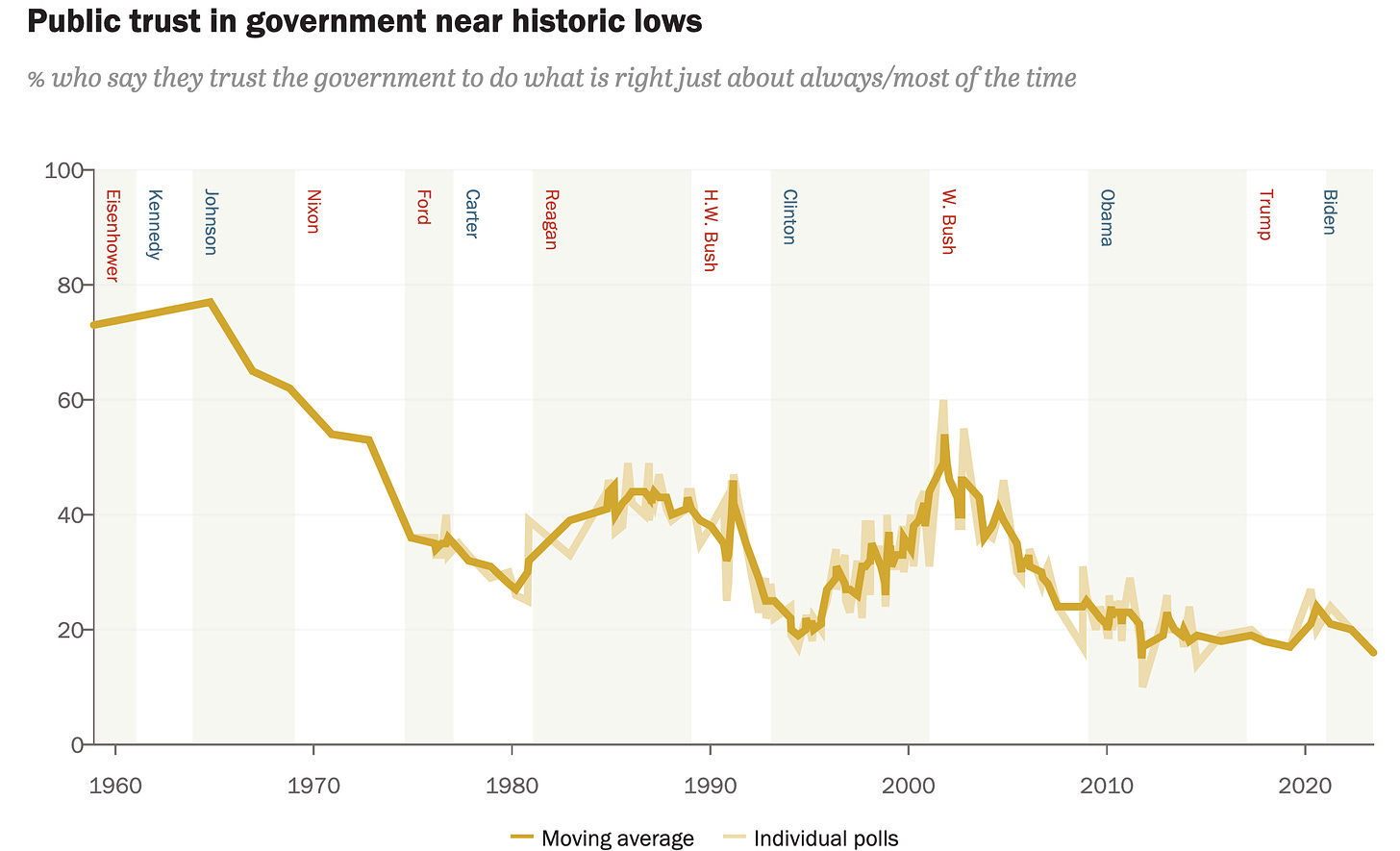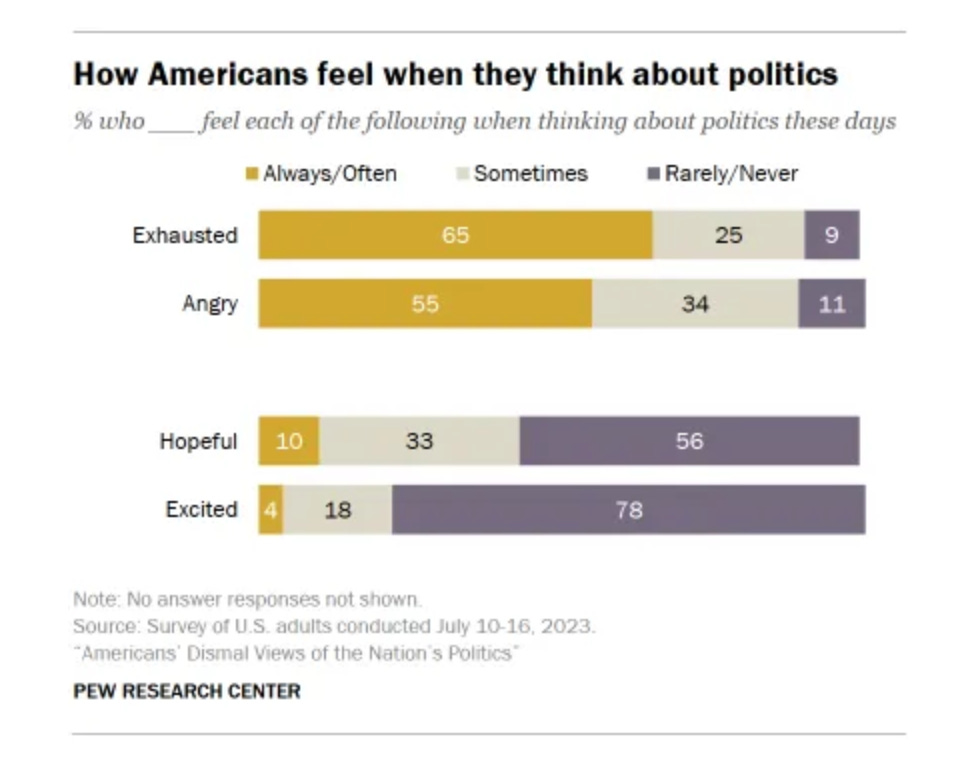In his Message Box SubStack this morning, Democratic pundit and Pod Save America guy Dan Pfieffer wrote about a recent poll from Pew Research. It found that belief in government effectiveness is at abysmal levels. He wrote:
This environment is more volatile and unpredictable than I have experienced in my more than two decades working in politics. It’s no surprise. The public is still processing the national trauma of the biggest pandemic in a century — which killed more than a million Americans and disrupted our lives and families. Inflation spiked for the first time in four decades; and our media ecosystem is undergoing a rapid and radical transformation. This is the “why,” but what’s the “how?”
He then goes on to cite the Pew Poll. Here is one of the charts from that survey, showing the percent who say that “they trust government to do what is right just about always/most of the time.”
There are some very interesting dynamics to this chart. The peak of the graph comes in the Johnson administration. While there are many factors likely involved (some halo effect post-JFK assassination), it’s worth noting that both Medicare and Medicaid went on line in 1965, following the Civil Rights Act and the Voting Rights Act. This was also before the War in Vietnam turned south.
There is a gradual decline through Nixon/Watergate, bottoming out at 27% as the Carter administration gives way to Reagan. There’s a brief rise during Reagan’s Morning in America phase. There are positive blips around both Gulf Wars for George HW Bush and George W. Bush. Declines in the GWB administration aligns with the Iraq War dragging on and the financial crisis of 2008-2010.
I skipped over the 1994 trough during the Clinton administration. That corresponds to the Gingrich revolution and a government shutdown aimed at blockading the Clinton’s policies. Things hit the same low level during the Obama administration, likely due to the slow recovery from the Great Recession and Republican obstruction of Obama’s policies. Things get a little better in 2020 (all the way up to 24%!) likely to do federal response to Covid, including lots of stimulus money. The decline since 2020 in likely explained by partisan obstructionism combined with concerns about inflation.
Pfieffer shared another data point that underscores public distrust in government. He noted that Pew had asked people an open-ended question to describe how they felt when they think about politics.
Those top two bars are very instructive. The majority of respondents were either exhausted or angry about the state of our politics. Only one in ten were hopeful.
I’ve written about this before, but part of this is the result of the divorce of politics from governance. Increasingly, the strategy in our politics seems to stop on election day. The important piece is to beat the opponent, who likely is on the verge of destroying America as we know it. Most voters probably know that this is just so much campaign rhetoric and get frustrated because nothing seems to change. The right-track, wrong-track polling (which I hate) has shown the same frustration for decades.
This frustration can be seen in the current stalemate in the House of Representatives. Former Speaker McCarthy made deals with the right-wing faction of his party (notably the one-person motion to vacate) in order to get to be speaker. That came back to bite him two weeks ago. After Steve Scalise made his attempt to become speaker last week, it was Jim Jordan’s turn. The last two days have shown that Jordan cannot build a winning coalition, to say nothing of a governing one.
Perhaps this is because Jordan’s approach to governing is to dismantle things like the DOJ or the FBI or the DHS or any number of other important government functions (plus lots of people just don’t like him). So governing cannot happen because their isn’t a speaker and Republican leadership refuses to support working with Democrats.
Brian Beutler, in his excellent Off Message SubStack (which I’ve just recently subscribed to) explains the larger problem.
But this is, in abstract form, the crisis America faces. Donald Trump is the main manifestation of it, Jordan as speaker would also pose a real danger. American democracy has many other weaknesses, loopholes, and antidemocratic components. But the acute threat is from this partisan formation, this perpetual-motion machine of bad faith, and it will continue in this way until its leaders are stopped for rejecting truth and the rules of fair play.
They actually have to be defeated on the specific terms they set; their bluff—“what we want or the country gets it”—has to be called or they’ll keep blustering their way into more and more power, more and more victories.
You often hear politicians of both parties claiming that their policies are “what the American people want” when they really mean “what my primary supporters and donors demand.” There is a dearth of actual effort to reach out to specific constituents of a representative democracy and figure out how to improve their lives.
Perhaps one reason they don’t try governing is because the problems are hard. As I wrote a couple of weeks ago, someone needs to tell voters the truth that gas prices are impacted by global markets and egg prices, while fluctuating, aren’t going to go down to 2010 levels. There is only so much that any government can do to actually rein in inflation short of nationalization of markets.
This was noted by David Brooks in a column two weeks ago. In writing about Biden’s attempts to deal with significant issues, he notes that the lack of trust in government is not just an issue for the United States.
Anger about inflation is ripping across the world and has no doubt helped lower the approval ratings of leaders left, right and center. Biden’s 40 percent approval rating may look bad, but in Canada, Justin Trudeau’s approval rating is 36; in Germany, Olaf Scholz is at 29; in Britain, Rishi Sunak is at 28; in France, Emmanuel Macron is at 23; and in Japan, Fumio Kishida is also at 23. This is a global phenomenon.
As Jonathan V. Last observes regularly, people have very short memories when it comes to economic issues. They have rosy memories of what the pre-Covid economy looked like, even though the macroeconomic markers have returned to those earlier levels. Missing from their memories were all of the actual governmental interventions that took place during 2020 and 2021. Once those policies — stimulus, expanded child tax credits, rent supports, loan pauses, small business (and grifter) loans — went away, people simply remain aware of the gaps: “It seemed like I had more cash flow before”. They did!
So how do we restore faith in government? The most important step is to return our legislative bodies to actual governing. In the House, that means lessening the obstructive tendencies of the minority party. If the administration has a policy agenda that by virtue of winning a national election is moving forward, the minority party’s role is to sand off the extreme edges of that policy, not to block it entirely. When McConnell (I know that’s the Senate) said this party’s goal was to make Obama a one-term president, that destroys confidence in government. The Senate filibuster needs major reform in order to reach bipartisan policy objectives without requiring a SuperMajority. The Blue Slip process needs reform to keep military leadership and foreign ambassadors in their roles.
It also requires a change in campaigning. Candidates can rightly differ on policy solutions to real problems. What they shouldn’t do is to deny reality by arguing the crime is out of control or that fentanyl can be easily stopped or that we can’t accept asylum seekers. They need to be bound by some elements of truth.
Surprisingly, I’m less concerned about media infrastructure than one might think. It is true that some segments of the electorate have committed to a slanted view of the news. But most people are actually not news consumers. They would rather spend their time watching sports or reality television. They don’t read a lot about current events and certainly don’t pay attention to the 2024 election in October of 2023.
Candidates who talk about what could actually be done to improve lives instead of arguing about “out of control budgets” or “socialists” or “borders” or “fascists” could really make a difference. Recent initiatives on abortion rights have made clear that when people feel that they can make a difference, they act.
So how do we regain the public’s trust in government? By making a commitment to demonstrating how it can work. That’s a tall order and I’m not suggesting it will be easy. But what we are doing now clearly isn’t working. The politicians, in light of things like the Speaker’s race, like to say “let’s get on with the people’s business”. It would be wonderful if they actually tried that.






